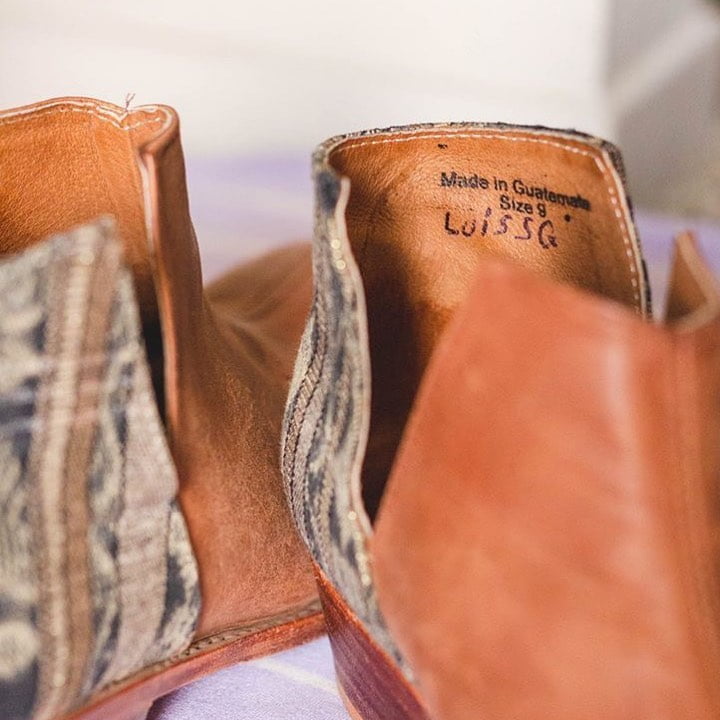What exactly are eco friendly shoes? And what makes sustainable shoe brands sustainable? What about recycled shoes? And what’s wrong with sneakers? How about fair trade shoes?
With every step, and in ways seldom considered, we contribute to a trend, for good or for harm, that affects for both the environment and those involved in the manufacture of these ancient and essential pieces of apparel. This guide to sustainable shoes covers the basics you ought to know to make an informed and conscientious choice, and discusses some of those brands that are trying to make a difference.
Searching specifically for vegan footwear? Check out our dedicated guide to vegan shoe brands.
This article about ethical shoe brands contains affiliate links. See our full disclosure here.
Sustainable Shoes: An Introduction
For centuries, shoes have carried huge cultural, religious and political significance; from the Ancient Greeks using ritual shoes as gifts for the afterlife, to shoe-throwing as a form of modern-day political protest. On a fundamental level, shoes allow human beings to navigate the world’s myriad of natural and urban spaces; enabling us to move through life’s vast experiences and realise our physical potential.
Classic fairy-tales depict shoes as liberating entities, appearing as figures of transformation and hope for the likes of Cinderella and Dorothy. With Manolo Blahnik acknowledging the Sex and the City series played a monumental role in his career, and Kanye West’s Yeezy sneakers recently selling for a record $1.8 million, there is no doubt shoes still carry powerful magical symbolism.
Yet behind the smoke and mirrors lies a deeply complex and unsustainable world. Rather than emerging from enchanted faraway places, shoes are a product of a global capitalist industry which relentlessly feeds a devastating portfolio of human rights violations and ecological crises.
With 24.2 billion pairs of shoes manufactured in 2018 alone, and the industry’s global revenue predicted to hit $500 billion by 2027, what is the true cost of our burgeoning footwear addiction?

Some facts for eco-friendly shoe brands: What’s in a Shoe?
The booming footwear industry is responsible for 1.4% of global GHG emissions, that’s equivalent to 700 million metric tonnes of carbon emissions. (5) Along with a colossal carbon footprint, the industry is infamously known for its ruthless extraction of raw, non-renewable materials and production of hazardous and non-recyclable waste.
Shoes these days are not made to last and are invariably an eclectic mix of components (plastics, leather, petroleum, textiles) which are glued and moulded together making them near impossible to recycle. After an ephemeral existence, a pair of shoes is either incinerated or thrown into landfill, with synthetic materials such as ethylene vinyl acetate (universally found in the shock-absorbent midsole of trainers) taking up to 1,000 years to break down. Polyvinyl Chloride (PVC) found in most uppers and outsoles not only pollutes ecosystems but is listed as carcinogenic by the World Health Organisation.
Textile treatment and dying is responsible for 20% of global industrial water pollution with vast quantities of harmful by-products bleeding in to the natural environment. In 2011, environmental organisation Greenpeace found manufacturing facilities in China linked to Nike, Adidas and Puma were responsible for releasing huge amounts of toxic chemicals into the Yangtze and Pearl River deltas.
Conventional chrome-tanned leather production is problematic with the raw material extraction and tanning stages of leather shoes contributing to over 50% of its ecological impact; along with the notoriously unscrupulous working conditions of tanneries in developing countries such as Bangladesh, where most employees aren’t expected to live beyond the age of 50.
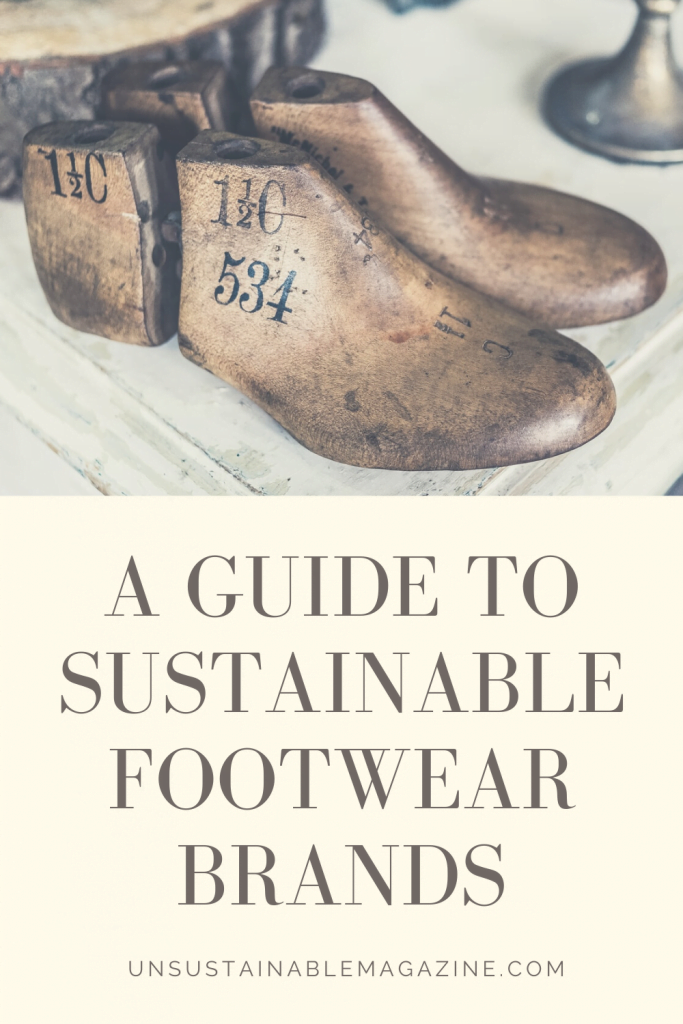
Our List of Sustainable Footwear Brands
Although entering unchartered territory, many ethical brands are putting their best foot forward as they challenge the sartorial status quo that has been crippling our natural world for decades. A truly sustainable footwear economy will not happen overnight yet if one of the most polluting industries in the world has the capacity to make sustainability fashionable, then we surely have hope for the future.
The Complete List of Sustainable Shoe Brands: Including Allbirds, ALOHAS, Deux Mains, Cariuma, SAOLA, Gorman, Cocobelle, Jibs, VEJA, and many more.
Done By Matea
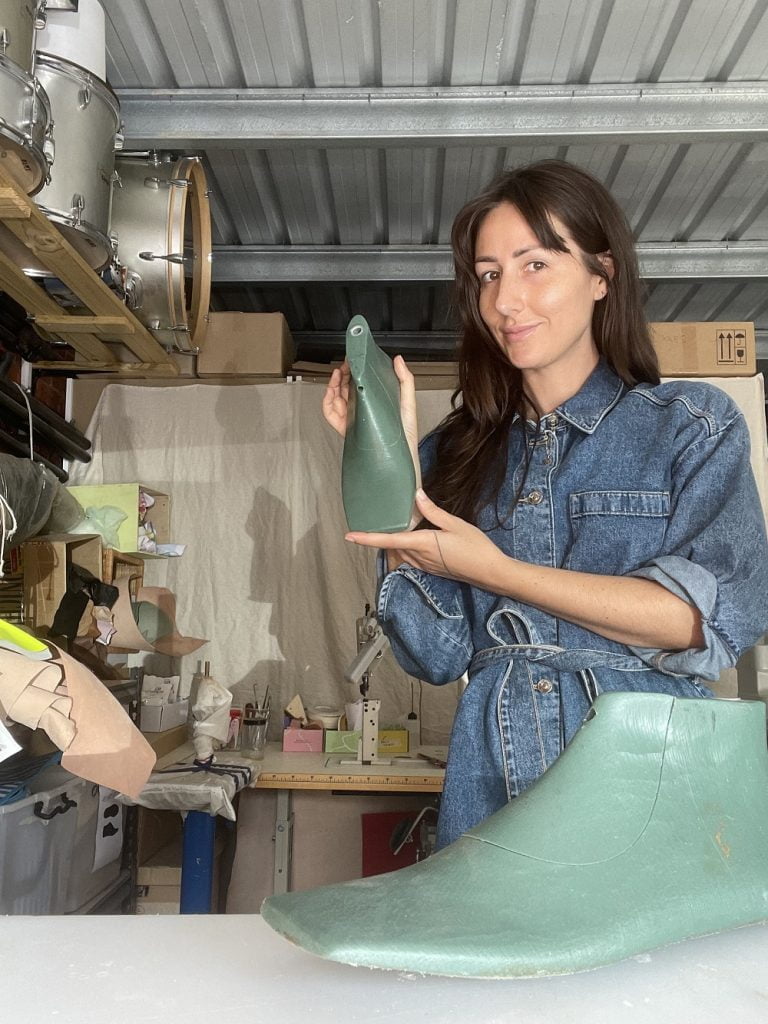
“Creating unique handcrafted shoes for unique people.”
Based: Melbourne, Australia
Shoe range: Slides, sandals, heels, boots and custom designs
Price range: $350 – $2,600 (varies if custom made)
Ships to: Worldwide
Ethos: Slow fashion, custom made, artisan, handcrafted, sustainable materials, ethical supply chain
Done by Matea is a slow artisan shoe brand that creates dreamy, fun and beautiful styles while staying committed to slow, sustainable and ethical processes. Perfectly handcrafted and indeed striking, every pair of Done by Matea footwear is a true work of art, with ethically made shoes composed of sustainable materials such as vegetable tanned kangaroo leather, organic cotton, eucalyptus fibres and Australian FSC Certified pine.
Baabuk

‘All the qualities of wool, from its traditional heritage to its technical properties to its environmentally responsible attributes, make it a fibre with no equal.’
Based: Renens, Vaud, Switzerland
Shoe range: Sustainable slippers, sneakers
Price range: €59 – €125
Ships to: Worldwide
Ethos: Sustainable materials, social impact, fair working conditions, handcrafted, family business, ethical production
Baabuk utilises the extraordinary natural qualities of wool (being both renewable and biodegradable) to make comfortable, durable and sustainable footwear. Wool not only retains moisture, it also contains keratin (as found in our fingernails) making it a long-lasting and flexible fibre with fewer shoes ending up in landfill. Sheep are natural carbon sequesters making wool an extraordinarily sustainable fibre.
VIVAIA
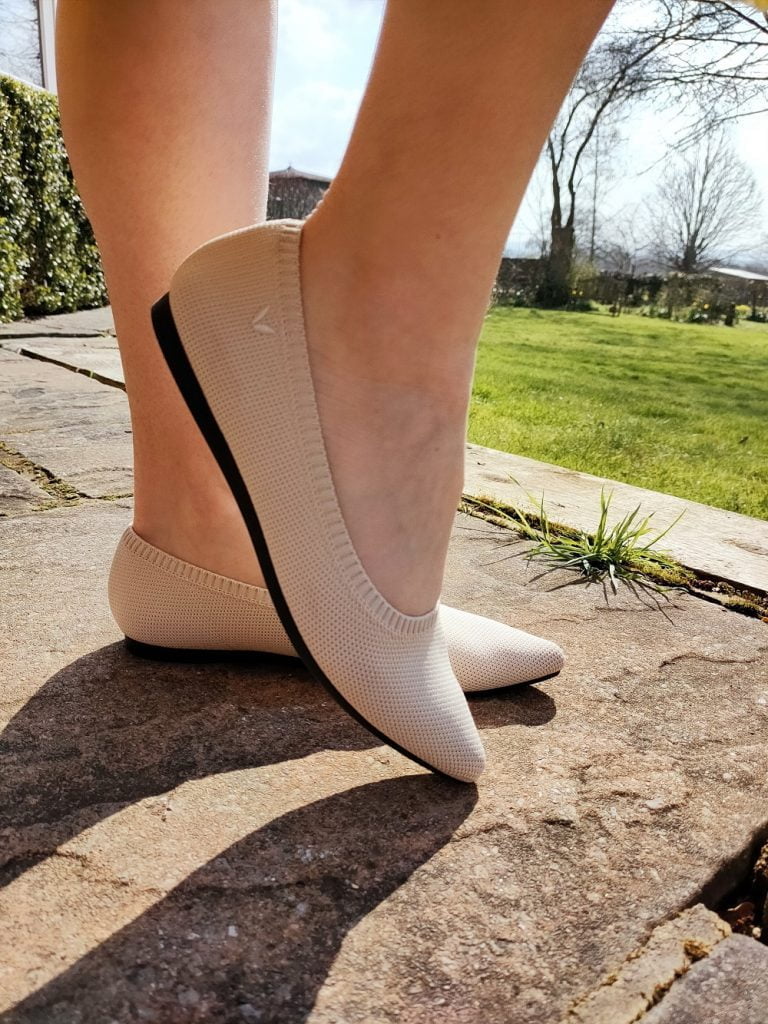
“Sustainable. Stylish. Straight To You.”
Based: Miami, Florida, USA
Shoe range: Flats, loafers, heels, sneakers, sandals, mules, boots
Price range: $99 – $199
Ships to: Worldwide
Ethos: Recycled and renewable materials, zero-waste, ergonomic design, ethical supply chain, slow fashion
Stylish and unwaveringly responsible, VIVAIA sustainable shoes are the essence of “conscious comfort.” Flawlessly marrying revolutionary technology with high sustainable and ethical standards, VIVAIA creates luxurious and eco-friendly footwear that places people, and the planet, at the heart of every design.
Bullfeet
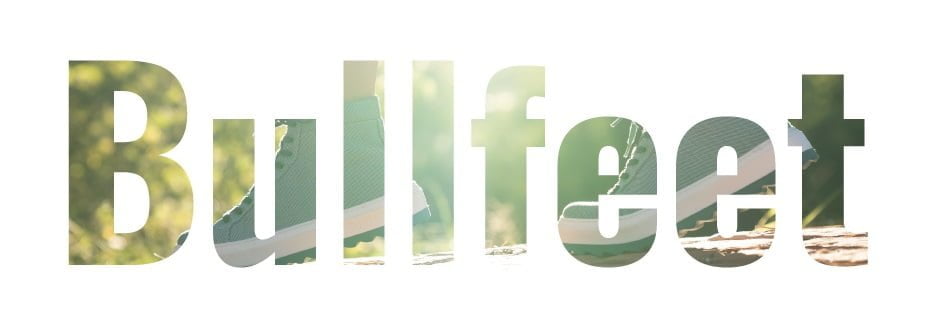
“Unique shoes designed by you.”
Based: Almansa (Albacete), Spain
Shoe range: Sneakers, high-tops, chelseas, slip-ons
Price range: €89 – €123
Ships to: Worldwide
Ethos: Custom-made, slow fashion, recycled materials, zero-waste, made-to-order, vegan
Strong advocates for slow fashion principles, Bullfeet creates custom-made, vegan-friendly sustainable shoes that are unique, sustainable and affordable. Determined to reduce colossal waste and pollution indicative of the fast fashion industry, Bullfeet has a zero stock philosophy and makes shoes from recycled materials such as PET fabrics, hemp fibres, cork scraps and clothing waste.
Cocobelle

‘At our core we believe Fashion shouldn’t be fast, it should last.’
Based: Stamford, Connecticut, USA
Shoe range: Sandals
Price range: $119- $298
Ships to: Worldwide
Ethos: Sustainable lifestyle, handcrafted, slow fashion, locally sourced materials, ethical production
Designed with the avid adventurer in mind, Cocobelle sandals are handmade by skilled artisans in Southern Italy under ‘empowering’ working conditions. Using only locally sourced and high-quality materials, Cocobelle challenge the ‘model of destruction’ defined by the fast fashion industry.
Allbirds
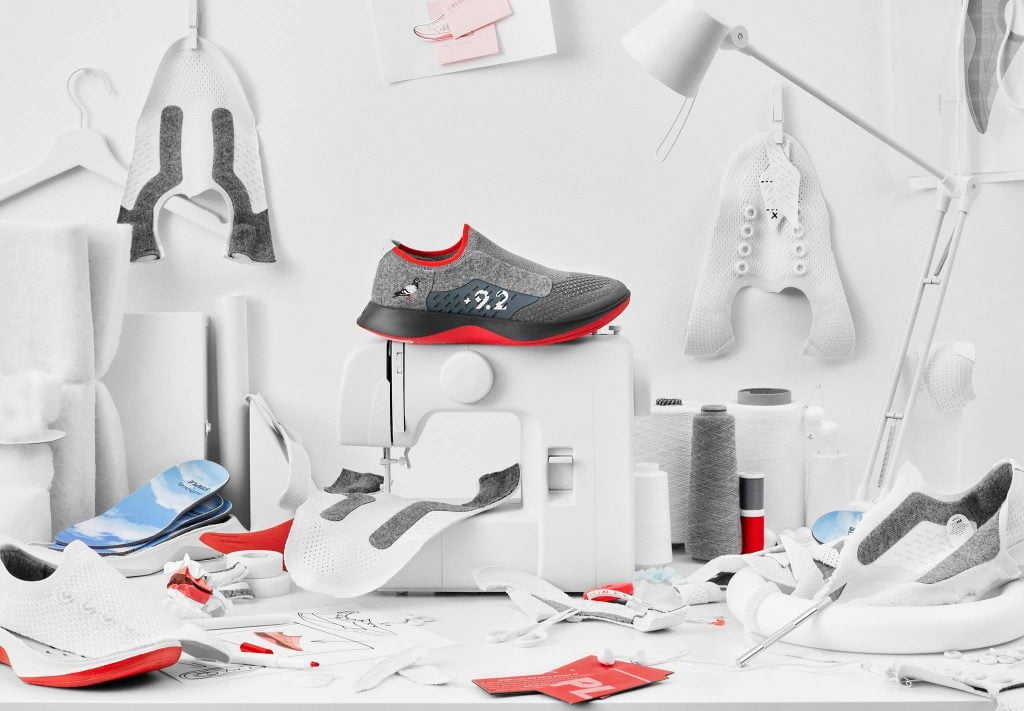
‘Give Light Tread Lighter’
Based: San Francisco, California, USA
Shoe range: Sustainable sneakers, slip-ons, flats, boat shoes, high-tops, weather repellent
Price range: $95 – $135
Ships to: Worldwide
Ethos: Natural and sustainable materials, circular supply chain (Soles4Souls), carbon offsets, transparency
From durable uppers made from eucalyptus trees to contoured insoles engineered from castor beans, Allbirds is the first to create a carbon negative green EVA foam midsole eliminating the harmful petrochemicals found in traditional designs. Similar to nutritional food labels, Allbirds label every product’s carbon footprint, helping people to ‘tread a little lighter on Mother Nature’. These guys are focused on environmentally friendly shoes.
ALOHAS
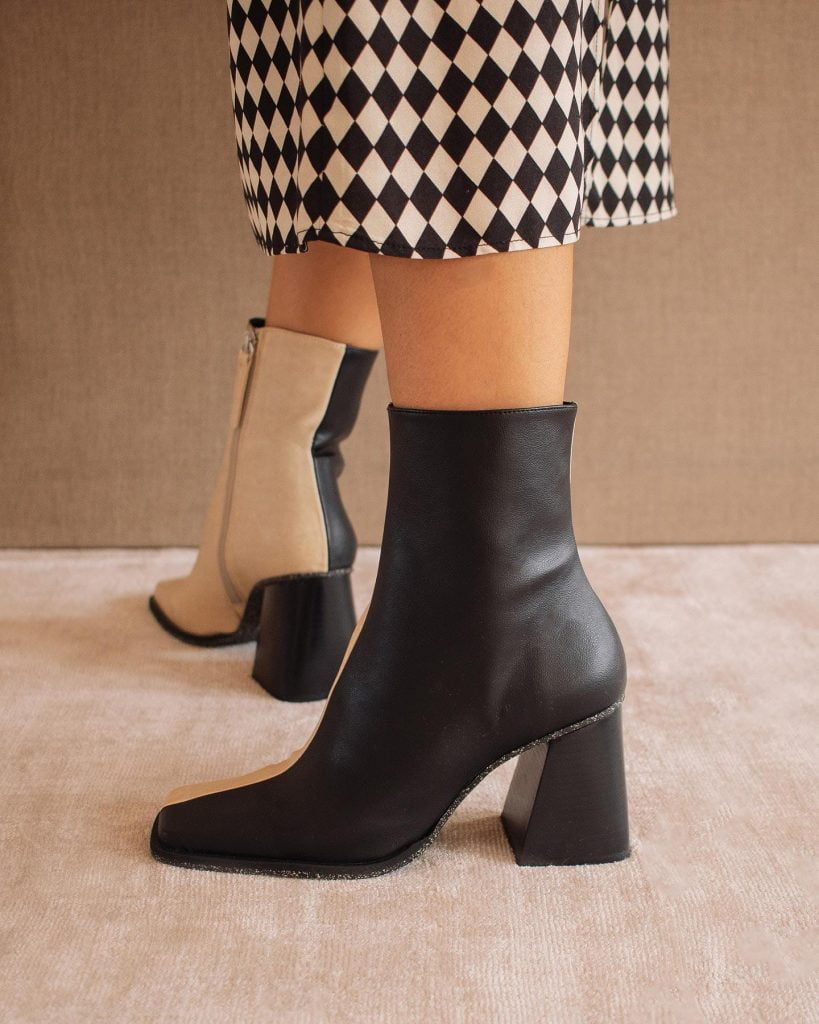
“Sustainable production. Responsible shopping.”
Based: Barcelona, Spain
Shoe range: Sandals, Boots, Espadrilles, Loafers, Heels, Flats, Sneakers
Ethos: On-demand fashion, carbon offset initiatives, sustainable materials, local craftmanship, sustainable shoes womens
Shipping: Worldwide
Challenging overproduction which permeates the fast-fashion industry, ALOHAS established an on-demand production model in 2019; encouraging people to shop in an environmentally conscious way. Certified by the Leather Working Group, ALOHAS ensure ethical working conditions by employing local artisans, and participates in carbon offset initiatives such as native forest regeneration and renewable energy projects.
Deux Mains

‘Great jobs and beautiful products.’
Based: Orlando, Florida, United States
Shoe range: Sandals
Price range: $28 – $75
Ships to: Worldwide
Established in the throes of natural disaster, Deux Mains recognise the untold resilience of the Haitian community; providing decent employment for local artisans and facilitating education and paid training programmes with not for profit organisation REBUILD globally. Deux Mains aim for carbon neutrality, source its leather from one of the top ten sustainable tanneries in the world and combine recycled and high-quality materials to make products that last.
Cariuma
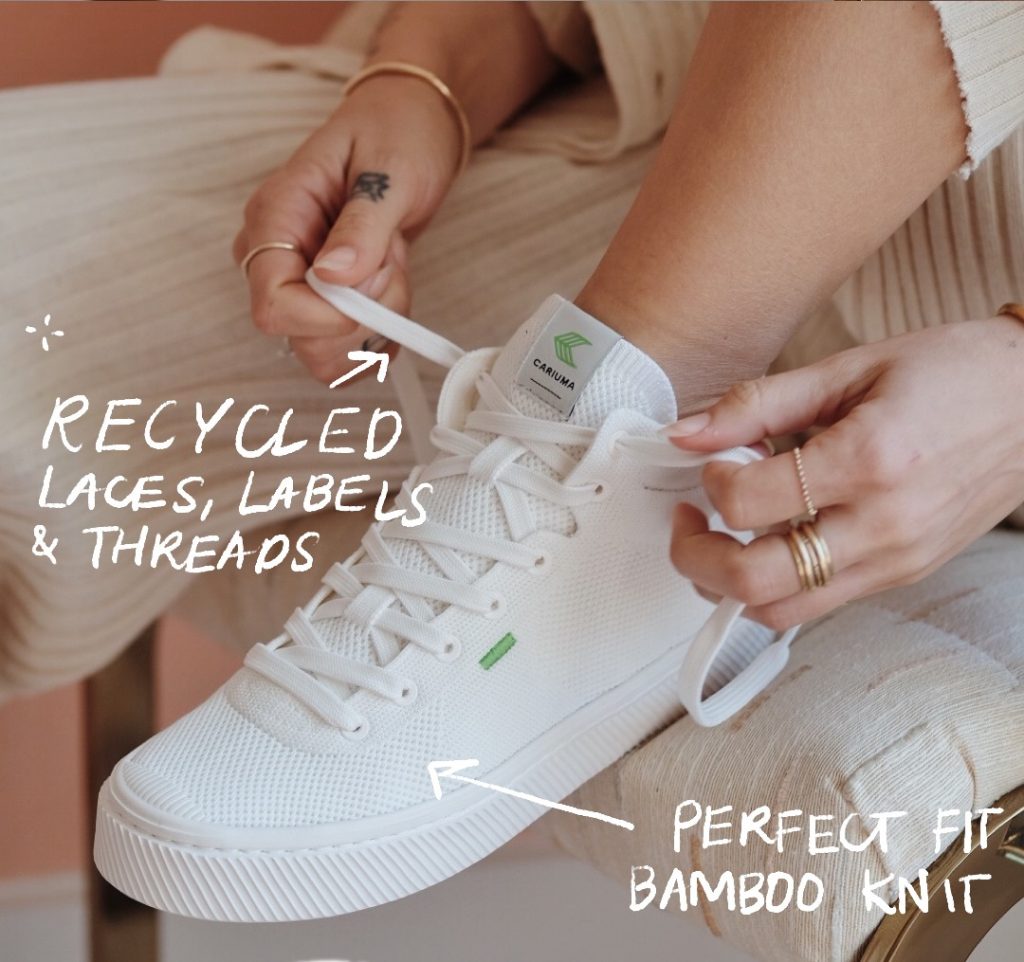
‘Empowering sustainable choices.’
Based: Rio de Janeiro, Brazil
Shoe range: Sustainable sneakers
Price range: $79 – $ 159
Ships to: Worldwide
Challenging ephemeral fashion trends, Cariuma create high-quality and timeless styles using sustainable materials; from plant-based petroleum alternative mamona oil to bamboo as a natural carbon sequester. Cariuma hold a number of sustainable certifications (including Global Recycling Standard and Leather Working Group) and has established a Reforestation Programme in Brazil.
Fortress of Inca
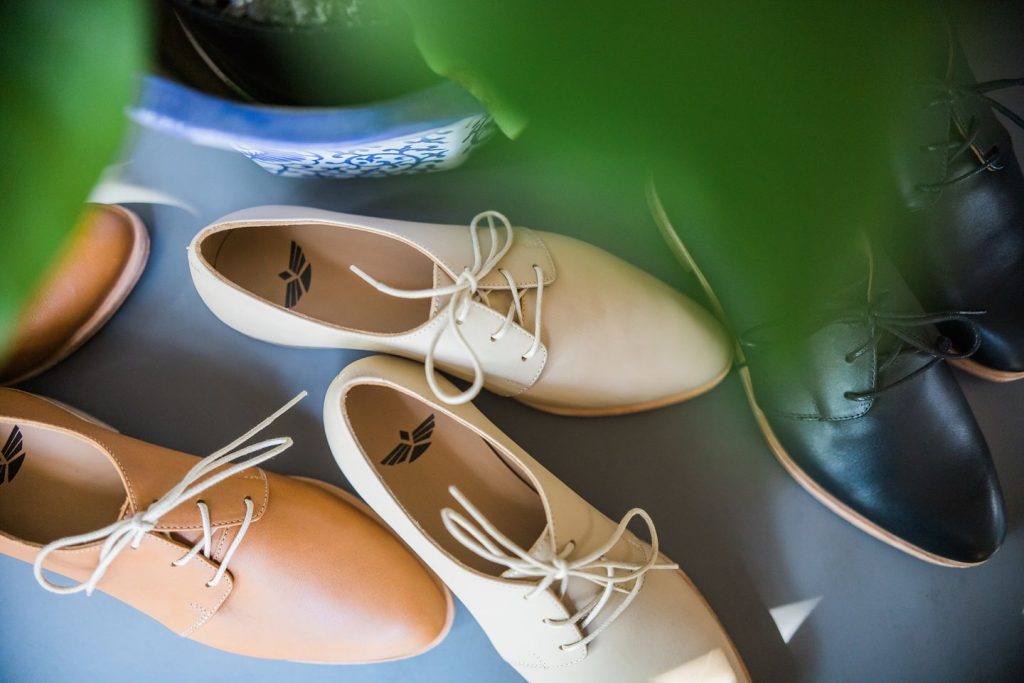
‘We believe the people who make the shoes are just as important as the people who buy them.’
Based: Austin, Texas, USA
Shoe range: Booties, boots, flats, heels, mules, sandals
Price range: $210 – $275
Ships to: Worldwide
Ethos: Fair trade, ethical partnerships, handmade, slow fashion, natural materials
Fortress of Inca prides itself on being a ‘slow fashion’ footwear brand that focuses on ‘quality over quantity’. Sustainable shoes handmade by family owned workshops and factories in Peru, Fortress of Inca creates perennial and versatile styles using only high-quality natural materials; encouraging people to buy premium products less often.
SAOLA
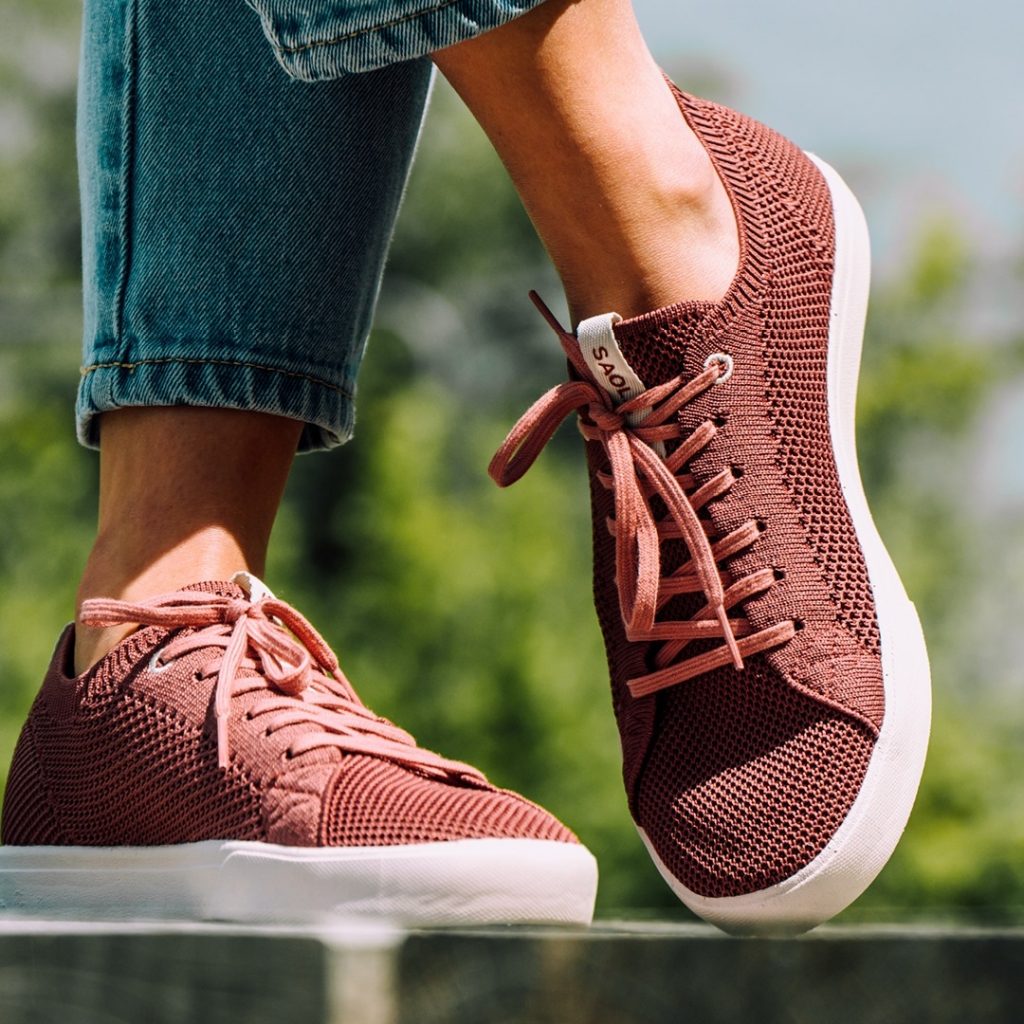

‘Never be satisfied with the status quo.’
Based: Annecy, France
Shoe range: Sustainable sneakers
Price range: €69.95 – €139.95
Ships to: Worldwide
As 60-70% of a shoe’s ecological impact comes from component parts, SAOLA only use natural or recyclable materials; from laces made from certified organic cotton, to 3-7 recycled plastic bottles used for the shoe top. SAOLA soles consist of 20% algae which cleans around 100 litres of water per pair. Committed to protecting the world’s biodiversity, SAOLA donate 1% of every shoe sale to grassroots organisation Mwalua Wildlife Trust.
Gorman

‘[Gorman] are forever proud to dress those who dare to be themselves’.
Based: Melbourne, Victoria, Australia
Shoe range: Sustainable sneakers, sandals, heels
Price range: $169 – $199
Ships to: Worldwide
Gorman is passionate about maintaining strong social and ethical policies; paying workers a fair wage alongside establishing safe and dignified working conditions. Committed to minimising its environmental footprint, Gorman design longevity into every product, established an organic label in 2007, and reduced plastic packaging of bulk orders by 90%.
Jibs

‘We believe in stepping in to the good.’
Based: New York City, New York, USA
Shoe range: Recycled shoes, flats, boots
Price range: $65 – $85
Ships to: Worldwide
Ethos: Traditional craftmanship, eco-friendly materials, travel and adventure, local community
Inspired by a ‘love of travel, adventure and life’, Jibs’ summer sustainable footwear is handmade in Brazil from recycled soles and biodegradable leather that is now certified by the Leather Working Group. Conventional leather is only 30% biodegradable and takes 50 years to compost. By contrast, Jibs’ ‘perfect perforated leather shoe’, using non-hazardous chemicals and less water, is 98% biodegradable and takes a mere 200 days to compost.
Suggies

‘We have a simple construction of great materials […] That allows for less transportation/ lower C02, and fair wages paid to California workers.’
Based: Los Angeles, California, USA
Shoe range: Flats
Price range: $149.95
Ships to: Worldwide
Ethos: Fair working conditions, locally made, sustainable materials, planet – friendly, ethical supply chain, handcrafted
Handcrafted in California, Suggies sustainable shoes have a low carbon footprint producing only 4.8lbs of CO2 emissions per shoe whilst a typical shoe uses 30lb (the equivalent of leaving 100-watt bulb on for 1 week). Suggies consist of water-based glues for stitch construction, high quality Italian ‘buttery’ leather from responsible Gold certified tanneries and are made to order which generates less waste.
VEJA

‘VEJA, in Portuguese, […] means “look”. For us, that means look at what’s behind the sneakers.’
Based: Paris, France
Shoe range: Recycled shoes, sneakers
Price range: €85 – €270
Ships to: Worldwide
Ethos: Zero advertising, fair trade, vegan, range, upcycling, sustainable materials, innovation, transparency
VEJA challenges the status quo by creating sneakers made from certified organic cotton purchased from farming families in Brazil and Peru, wild rubber cultivated by indigenous communities in the Amazon rainforest, as well as polyester fibres made out of recycled plastic bottles and vegan leather alternatives developed from vegetable materials.
Adelante Shoe Co.

‘From cobbler to customer.’
Based: Cambridge, Massachusetts, USA
Shoe range: Moccasins, loafers, boat shoes, brogues, boots, derby shoes, mules, sandals
Price range: $125 – $350
Ships to: Worldwide
Ethos: Sustainable economic development, fair working conditions, empowering communities, handcrafted
Established in response to poverty and social injustice in Latin American, Adelante believe quality shoes come from a place of equality; empowering every craftsman ‘to achieve their definition of living well’ through fair wages, first-rate education, food and transport. Every pair of sustainable shoes is made to order with customers virtually connecting with their cobbler throughout the production process.
Mbaetz

‘In a natural but time-consuming process […] genuine natural leathers are resulting, that lay the foundation for a sustainable and unique shoe.’
Based: Erfurt, Germany
Shoe range: Slip-ons, lace-up, boots, pumps, sandals, slippers, mules, ballerinas
Price range: €55 – €589
Ships to: Worldwide
Ethos: Sustainable materials, handmade, slow fashion, ethically made, fair trade, vegan range
Echoing a 5000-year-old tradition, Mbaetz incorporates a painstaking method using vegetable extracts to tan leather rather than intense chemical treatments found in mainstream processes. Their sustainable tanning practices ensure the safe removal of residues and fair working conditions in small, local factories.
VELDSKOEN
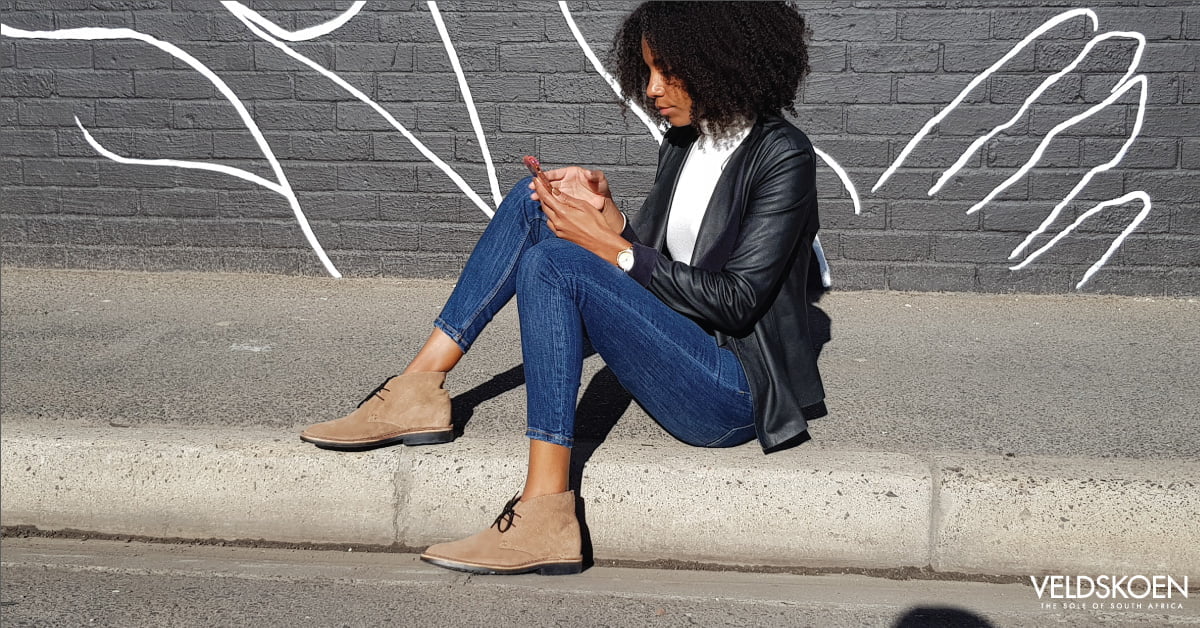
‘To us, sustainability is about making beautiful shoes that last.’
Based: Cape Town, Western Cape, South Africa
Shoe range: Boots
Price range: $99 – $179
Ships to: Worldwide
Ethos: Empowering communities, handcrafted tradition, family business, sustainable materials, carbon offsets
Challenging the in-built obsoleteness that permeates the fast fashion industry, Veldskoen create ethical shoes that last. Immersed in 400 years of handcrafted tradition, Veldskoen only use superior, locally-sourced natural ingredients; and offset their carbon emissions by investing in tree protection schemes, creating better shoes ‘for a better world.’
Wilder

‘I founded this company because I believe everyday footwear should be as elegant as it is enduring x Roberta.’
Based: Sleepy Hollow, New York, USA
Shoe range: Boots, heels, flats, sandals
Price range: $265 – $325
Ships to: Worldwide
Ethos: Empowering women, eco-conscious supply chain, fair working conditions
Designed for creative and independent women, Wilder prioritise running ‘a business with integrity’ by buying vegetable tanned leather wherever possible, designing packaging with 100% recycled paper and ensuring safe and fair working conditions.
Freewaters
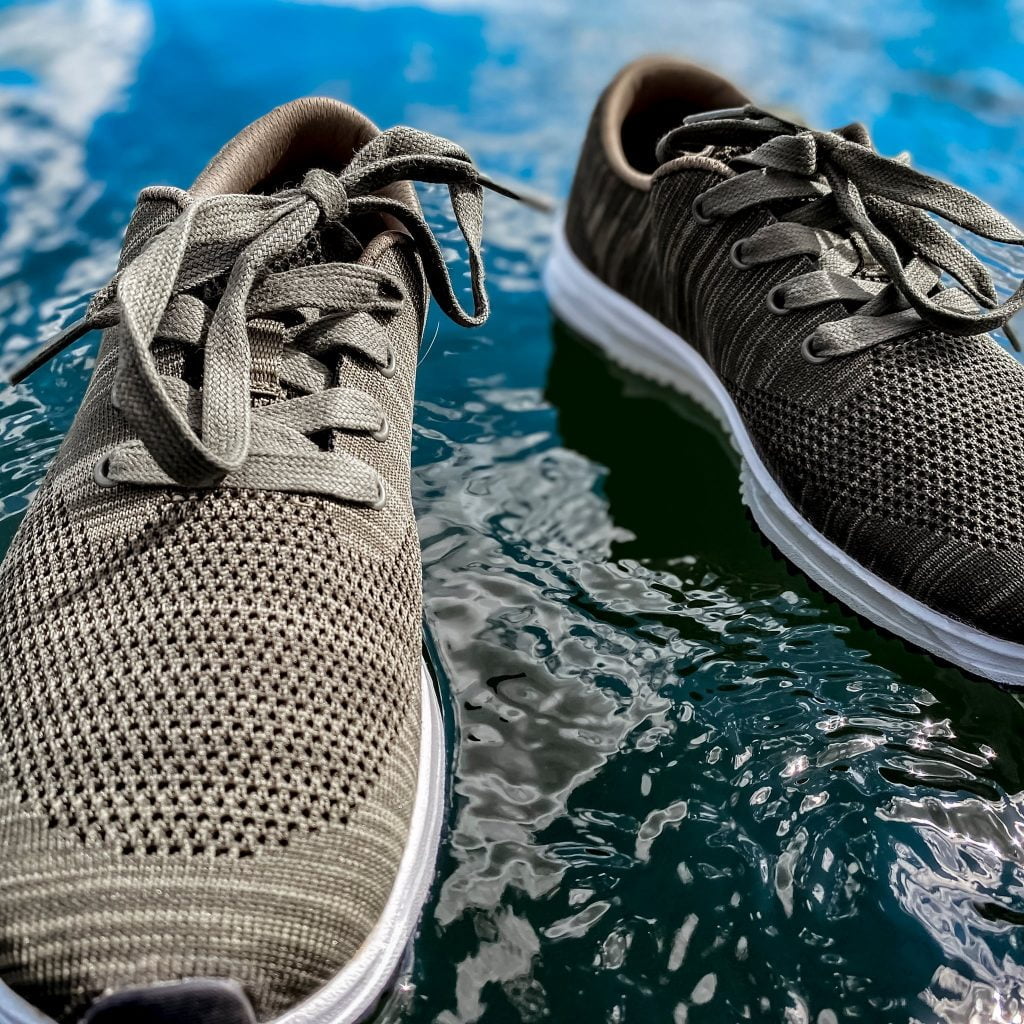
‘Stepping in to sustainability’
Based: San Clemente, California, USA
Shoe range: Recycled shoes, sneakers, slippers, sandals, boots
Price range: $26 -$125
Ships to: Worldwide
Ethos: Sustainable materials, grassroots clean water projects, vegan range, fair working conditions
Freewaters only use PVC free materials and water-based glues along with recycled rubber for footbeds and Cradle to Cradle eco stone powder for packaging. Since 2020, all of their sustainable footwear features E-Dye, which uses 75% less water and fewer chemicals. Freewaters use Gold certified Responsibly Sourced Leather employing an on-site wetlands where chemicals from the tanning process are broken down by plants and organisms.
United by Blue
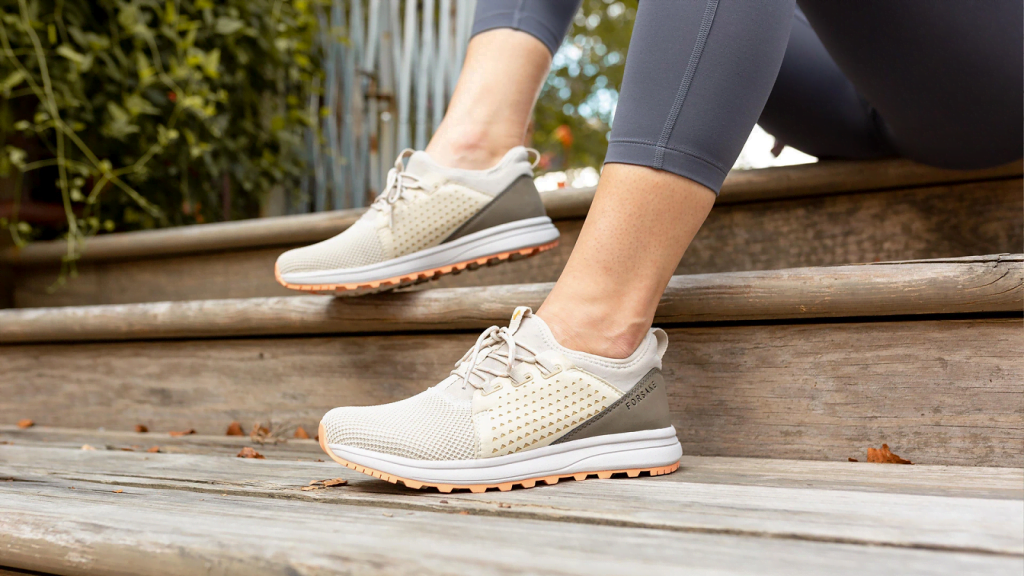
‘Everyday, 38, 356, 164 pounds of trash are dumped into our oceans. Let’s turn the tide.’
Based: Philadelphia, Pennsylvania, USA
Shoe range: Recycled shoes, sneakers, boots, slippers
Price range: $95 – $245
Ships to: Worldwide
Ethos: Ethical manufacturing, environmental clean-ups, vegan range, sustainable materials, eco-friendly lifestyle
Not afraid of “doing the dirty work”, United by Blue tackle our global plastic addiction by removing one pound of trash for every product purchased. Helping consumers tread lighter on the planet, United by Blue design sustainable and ethically sourced products using a myriad of natural and renewable materials built to last from bison fibre, wool, recycled polyester and hemp.
Rothy’s

‘We’re committed to a sustainable future.’
Based: San Francisco, California, United States
Shoe range: Sustainable flats, sneakers, sandals, boots
Price range: $55 – $245
Ships to: United States and Canada
Designing circularity in to every product, Rothy’s consider sustainability at every step of the production process; from materials to shoe recycling programmes. Rothy’s transformed almost 100 million plastic bottles into its signature knit, makes insoles using 30% plant-based oil and recycled rubber, and extracts harmful algae from biodiverse waterways for strobel boards and footbeds.
Eileen Fisher

‘We believe making clothes is a lifetime commitment.’
Based: Irvington, New York, United States
Shoe range: Sandals, sneakers, flats, boots
Price range: $125 – $285
Ships to: Worldwide
Challenging the fashion industry’s destructive throwaway culture, Eileen Fisher view clothing waste as a sustainable opportunity, so far taking back 1.5 million of its used items to be resold or repurposed. Empowering women to be climate activists, Eileen Fisher campaigns for equality and human rights; investing in activism and outreach programmes alongside audits and training initiatives that uphold fair and safe working conditions.
Giesswein

‘Giesswein: the merino wool innovators.’
Based: Tyrol, Austria
Shoe range: Casual shoes, ethical sneakers, sustainable running shoes, hiking boots, slippers
Price range: €29.99 – €199.95
Ships to: Worldwide
With the footwear industry wasting an estimated 20% of scrap material, Giesswein adopts sustainable manufacturing processes, with 0% of merino wool wasted and 90% of production water recycled. Giesswein ethically sources wool from Mulesing-free certified farmers and excludes artificial properties and chemicals, making it a 100% natural and biodegradable product.
Earth Origins
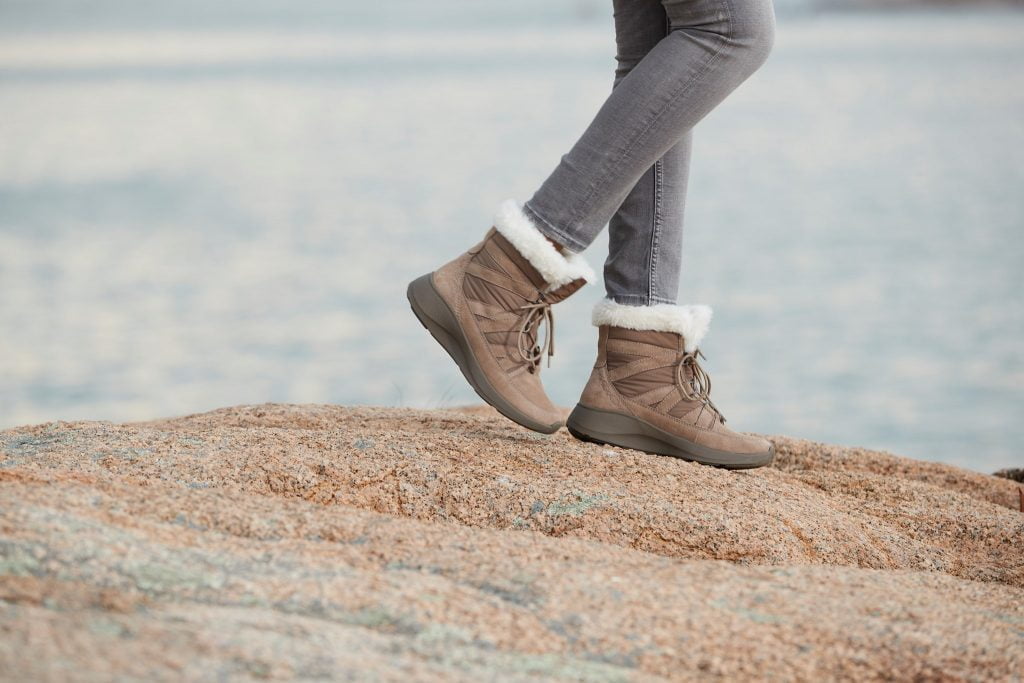
‘Responsible shoemaking.’
Based: Waltham, Massachusetts, USA
Shoe range: Boots, sneakers, flats, wedges, heels, sandals, casual
Price range: $65 – $180
Ships to: United States & Canada
Ethos: Eco-conscious, tree planting schemes, vegan range, sustainable materials, circular supply chain (Sole4Souls)
‘Championing wellness-led design’, Earth Origins footwear is infused with style, comfort and a low carbon footprint. Being ‘mindful to ourselves, our planet and our choices’ Earth Origins only use vegetable tanning for leather with tannic acids naturally derived from plant extracts alongside water-based adhesives allowing for safer working conditions.
Nisolo

‘Ethically made’
Based: Nashville, Tennessee, USA
Shoe range: Sustainable sneakers, flats, boots & chukkas, sandals, oxfords, loafers, slip-ons
Price range: $79 – $250
Ships to: United States (ships internationally via third party partner Garmentory)
Ethos: Fair working conditions, social impact, forest protection schemes, handmade, circular supply chain (Soles4Souls)
With factories in Trujillo, the shoemaking capital of Peru, Nisolo is the essence of traditional craftmanship and is committed to reducing its carbon footprint by donating to forest protection schemes in the Amazon Basin for every pair of shoes sold. Partnering with Sole4Souls, customers can send back their old shoes to pass on to micro-entrepreneurs in developing countries because ‘what goes around comes around.’
Mavette

‘Shoes designed by a woman for women.’
Based: San Mateo, California, USA
Shoe range: Boots, pumps, flats, sandals
Price range: $220 – $595
Ships to: USA, UK, and Canada
Ethos: Handmade, ethically production, transparency, eco-conscious, comfort technology
Mavette create premium styles without the pain with every shoe featuring patent-pending comfort technology. Handmade in Italy by local artisans who ‘have been honing their craft for generations’, Mavette only use high quality and ethically sourced real leather and suede; as well as ‘skip[ping] the middle man’ to guarantee transparency when sourcing materials, manufacturing and ecological impact.
Ocelot Market

‘Our products allow us to tell a story about the diversity and creativity of human life.’
Based: Brooklyn, New York, USA
Shoe range: Recycled shoes, loafers, mules, sandals, heels, boots, platforms, sneakers
Price range: $39 – $385
Ships to: Worldwide
Ethos: Eco-friendly materials, social impact, diversity, empowering communities, artisan-made, fair trade, tree planting schemes
Helping communities around the world, Ocelot Market believe handmade products, rich in ‘authenticity and tradition’, bring people together. Only using recycled, upcycled and locally sourced natural materials, Ocelot Market connect customers to ‘the life behind the product’ celebrating its culture, creativity and craftmanship. They trade not only in their own brand of sustainable footwear, but also in homeware, stoneware, jewellery and more, made by a global network of artisans.
Everlane

‘Our timeless basics are designed to last—so making the right choice by the planet can be as simple as putting on a T-shirt.’
Based: San Francisco, California, USA
Shoe range: Recycled shoes, boots, flats, sneakers, heels, wedges
Price range: $55 – $198
Ethos: Radical transparency, sustainable materials, vegan range, ethical supply chain, recycling and upcycling
Designing out virgin plastics and harmful chemicals, Everlane has recycled over 9 million plastic bottles and upcycled 1 million pounds of textiles with their Forever Sneaker made entirely from post-consumer waste. Everlane is GOTS Organic Cotton Certified and avoid using leather or suede from animals raised specifically for their hides.
Chelsea Paris

‘Never be satisfied with the status quo.’
Based: London, UK
Shoe range: Sustainable boots, heels, sandals, mules, loafers, sneakers
Price range: $220 – $595
Ships to: Worldwide
Ethos: Diverse creativity, handmade, sustainable materials, empowering communities
Chelsea Paris luxury and sustainable footwear is a blend of African heritage and European artistry using organic and cruelty-free dyes; along with vegetable-tanned and metal-free leathers that avoid the release of dangerous by-products into the environment. By donating to organisations that make a difference, Chelsea Paris focus on building community and challenging the status quo.
The Root Collective
‘Made by real people with real names.’
Based: Raleigh, North Carolina, USA
Shoe range: Flats, boots, sandals
Price range: $108 – $328
Ships to: Worldwide
Ethos: Social impact, fair working conditions, empowering communities, handcrafted, ethically made
Committed to healing a ‘hurting world’, The Root Collective work with a number of small, independent workshops in Guatemala supporting communities to ‘create incredible change’ through generating vital jobs for local artisans. Empowering women, The Root Collective purchase fabric handwoven by women in rural Mayan communities.
Nomasei

‘Timeless and ethical luxury.’
Based: Paris, France
Shoe range: Sandals, loafers, boots
Price range: €125 – €595
Ships to: Worldwide
Ethos: Slow fashion, sustainable materials, fair working conditions, empowering communities
Not conforming to the chaotic standard set by the fast fashion industry, Nomasei follow ethical requirements by using only organic cotton and metal-free leathers. So as to not compromise their commitment to sustainability and quality, Nomasei avoid using vegan leather as ‘in 90% of cases it is a material derived from plastic and petroleum’. Acknowledging that leather isn’t a faultless product, it is unmatched in terms of endurance and quality.
Filippa K

‘Designed to last.’
Based: Stockholm, Sweden
Shoe range: Sustainable sandals, lace shoes, flats, sneakers, boots
Price range: $280 – $750
Ships to: Worldwide
Aspiring to shift the industry status quo from mindless to ‘mindful consumption’, Filippa K maintain a slow fashion model that transcends the seasons; generating fewer high quality items that last. Adopting a circular production process, Filippa K follow the four Rs (Reduce, Repair, Resuse and Recycle) to minimise ecological impact and inspire conscious fashion choices.
The Ethics of Footwear: Humanitarian Concerns
Pain for Profit: Factory Conditions in the Footwear Industry
In 2013 the Rana Plaza in Bangladesh housing garment factories for many international clothing brands collapsed, killing 1,134 people and injuring thousands more. There were reports the day before of huge cracks forming along the 8-story building with many workers still forced to go in the following day. The world watched in horror as frantic scenes of death, suffering and survival unfurled, with unions calling it a ‘mass industrial homicide’.
Although the fashion industry has been under intense scrutiny ever since, the footwear industry still remains relatively undetected. In 2018, major footwear brands Adidas and Nike spent between $3.5 – $3.8 billion on marketing; perpetuating the fantasy that shoes arrive on our feet by magic when in reality they come from a place of disrepute and poverty.
Uyghurs for sale
A report by the Australian Strategic Policy Institute (ASPI) reveals between 2017 and 2019 the Chinese government facilitated the movement and forced labour of more than 80,000 Uyghurs and other ethnic minority groups from the far west region of Xinjiang to factories linked to 82 multinational brands including Nike, Adidas and Fila. In an aggressive bid to tackle ‘religious extremism’, Chinese authorities have forcibly detained Uyghur citizens and other ethnic minority groups in so-called ‘re-education camps’ since 2017. ASPI describes individuals suffering ‘political indoctrination, forced to renounce their religion and culture and, in some instances, reportedly subjected to torture’.
In response to the Chinese government ‘Xinjiang Aid’ labour initiative, the regime has entered the next phase, with ‘graduates’ believed to be transported straight from internment camps to factories such as Qingdao Taekwang Shoes Co. located in Laixi, China, one of Nike’s major factory suppliers. 8 million pairs of Nike shoes are produced by Taekwang factory every year, with many touching the hands of exploited Uyghurs who cannot go home.
Hell for Leather: Bangladesh’s Toxic Tanneries
The world’s oldest leather shoe was found in an Armenian Cave in 2011 and is thought to be 5,500 years old. Although the singular tanned cowhide and leather strap speaks to modern – day shoe design, the disparity between 21st century leather production and traditional pastoral living is vast.
According to the United Nations Industrial Development Organisation, leather is ‘one of the most widely traded commodities in the world’ and has an estimated world trade value of $100 billion per year. Whilst vegetable leather tanning is still utilised, 80-90% of leather globally is tanned using chromium; a chemically intensive process which leaves a swarm of environmental and human rights violations.
Hazaribagh
Bangladesh is the second largest exporter of leather, and leather goods, worldwide. With an export earning potential of $5 billion, prolonging environmental catastrophe and desperate working conditions is an easy feat for Bangladeshi governments and business leaders.
Hazaribagh, a slum in Dhaka, was once home to 95% of leather tanneries in Bangladesh. The Buriganga river runs an impervious black as 22,000 cubic metres of toxic waste choked its waterways every day; transforming this once essential natural resource in to the fifth most polluted location on earth.
In Bengali, Hazaribagh means ‘a thousand gardens’, yet for the estimated 180,000 residents it was nothing short of an apocalyptic nightmare. Tannery workers as young as 8 were found saturated in hazardous chemicals with many not expected to live beyond 50. International humanitarian NGO Médecins Sans Frontières conducted an intensive health assessment on 282 tanneries and found a severe lack of protective equipment as workers were subjected to hazardous conditions and a manifold of illnesses from respiratory diseases to skin conditions.
Following global pressure in 2017, over 150 tanneries moved from Hazaribagh to The Leather Industrial Park in Savar, Dhaka in the hope the situation would improve. Yet toxic waste is now relentlessly dumped in Savar’s Dhaleshwari river as workers continue to endure child exploitation, fatal working conditions and excruciating health problems.
Waste: The Footwear Industry’s Colossal Problem
The lethal combination of transient fashion trends and in-built obsolescence has left a world filled with unfathomable quantities of discarded shoes. When we donate or throw away an old pair of shoes, we hope ‘away’ means either the safe disposal of our waste or a charitable cause benefitting from our generosity. Yet in most cases the reality is very different, with every pair of discarded shoes creating a maelstrom of environmental, social and economic problems.
Can Shoes Be Recycled?
Shoes these days are complex entities containing up to 40 different materials from plastics and rubber to leather and textiles. This eclectic mix of components makes shoes almost impossible to recycle with the majority either burned or thrown in to landfill.
Planned obsolescence is inherent in most footwear designs with the standard athletic running shoes lasting only 6 months. Astonishingly, footwear brands candidly promote this disposable quality; perpetuating the toxic notion that shoes must be replaced regularly to protect our feet. A stark example of this is Nike’s Mayfly running shoe which wears out after 100km, and is aptly named after the insect which lives for 48 hours.
Footwear’s ephemeralness combined with an unsustainable blend of materials results in infinite quantities of shoes forever contaminating the natural environment. In 2018, around 66.3 million pairs of shoes were made per day with an eye -watering 90% of them tossed in to landfill.
Can Shoes Be Donated?
Some shoes are luckier than most and find a second life. Charities such as Sole4Souls and Shoe Aid work tirelessly to ensure as many shoes as possible are donated to communities in need rather than ending up as the world’s eternal garbage. But what about shoe donations that are too worn for charity?
Whilst donating your old shoes is a better alternative than throwing them in the bin, it isn’t always the philanthropic gesture we’d hope for. Liz Ricketts, fashion designer and co-founder of The OR Foundation, a not-for-profit organisation which analyses the second-hand clothing industry in Ghana, reveals only 10 – 20% of clothes donated to charity shops and donation bins are redistributed in the United States. After being sorted and graded by recycling companies and clothing charities, an astonishing 40-80% is shipped overseas to developing countries in Africa and Asia.
The Second-Hand Clothing Industry
Dead White Man’s Clothes, a multimedia research project by The OR Foundation, examines the second-hand clothing trade in Accra, Ghana where many of the Global North’s clothing goes once donated. Dead White Man’s Clothes comes from the Akan saying ‘Obroni Wawu’ or ‘the white man has died clothes’ which is the notion someone must have died to give away so many things.
Shipping containers filled with bales of second-hand clothing arrive in Ghanaian ports for resale at Kantamanto Market, the ‘world’s greatest closet’. Many Ghanaians benefit from the second-hand clothing trade however, it is impossible to ignore the cataclysmic scenes that surround Accra as landfills become choked with foreign waste.
It is estimated 40% of garments entering Ghana are informally burned, dumped or thrown in to landfill upon arrival; that’s 1 million pounds of garments every week.
Solomon Noi, Head of Waste Management for the Accra Metropolitan Assembly, reveals Accra has no control over what comes through the ports, with 2 out of 5 containers usually filled with unsalvageable waste. Unlike countries in North American and Europe, Accra simply doesn’t have the money or infrastructure to withstand such volumes of waste.
The Problem with Sneakers
In 1984, Michael Jordan, a fresh-faced basketball rookie, entered the court adorning the very first pair of Nike Air Jordan 1s. The standard white upper was switched out for a black one resulting in the NBA banning the shoes in accordance with uniform policy. Fans watched in awe as Michael Jordan went on to win Rookie of the Year, wearing his revolutionary ‘it’s gotta be the shoes’ sneakers to every game. MJ’s inspiring act of rebellion coupled with his unrivalled athletic finesse was a pivotal moment for the sneaker industry; transforming a mere sports shoe in to a powerful cultural symbol.
The Explosion of Sneaker Culture
The explosion of sneaker culture, alongside the perpetual race to create an athletic shoe that is better, lighter and stronger than the last, has pushed contemporary sneaker design to become more innovative and complex. Sneakers, like most shoes, are riddled with a toxic concoction of plastic and other synthetic-like materials making them a profoundly unsustainable product. For example, ethylene vinyl acetate, the shock-absorbent midsole found in most sneakers, takes up to 1,000 years to break down leaving a devastating legacy for the natural world. With the global athletic footwear market estimated to hit $95.14 billion by 2025, the sheer scale of this industry’s environmental footprint must not be underestimated.
A Sneaker Revolution
In the throes of ecological catastrophe slowly emerges a more hopeful future for contemporary sneaker design. Dutch footwear forecaster Nicoline van Enter believes a solution to the sneaker industry’s waste problem is minimalist design; the less components used to create a shoe means it has a better chance of being recycled later down the line.
Many sustainable sneaker brands listed in this guide are adopting a ‘less is more’ approach; replacing the multitude of toxic and virgin components with fewer materials that are recycled or natural. For example, Allbirds midsole is made from carbon negative green EVA foam, Freewaters uses recycled rubber for footbeds and Everlane’s Forever Sneaker is made entirely from post – consumer waste. Even mainstream footwear brands are exploring more sustainable models with Nike’s Flyknit running shoe consisting of 60% less waste than traditional shoes.
The Solution: Sustainable Footwear
In a global society rampant with profit hungry supply chains bulging with overconsumption and overproduction, it can feel impossible to determine those products spewed from the depths of capitalism’s dirty underbelly, and those which genuinely come from a sustainable source.
In an increasingly eco-conscious world, the term ‘sustainability’ has proliferated, with companies frequently using it to describe services, products and processes. But what does sustainability actually mean, and how do we know which shoes are sustainable?
What does ‘Sustainability’ mean?
According to the United States Environmental Protection Agency (EPA), sustainability is the deep symbiosis between humanity and nature, i.e. ‘the ability to maintain or improve standards of living without damaging or depleting natural resources for present and future generations’.
Unprecedented population growth, interminable consumption of natural resources and an exponential increase in economic growth has created a dangerously unsustainable world with nature and human societies hanging in the balance. A productive interconnection of social, economic and environmental systems based on regeneration rather than exploitation creates a sustainable future for all species.
The Definition of a Sustainable Product
Digital hub Sustainable Urban advocates for a product, or in this case footwear, to be sustainable it must adhere to the ‘4 sustainability pillars’:
- Responsible Materials: no use of harmful materials or degradation of natural resources
- Ethical Production: fair labour and a supply chain with low ecological impact
- Efficient Life Cycle: positive socioeconomic impact,low carbon footprint, practical, long-lasting and minimum waste
- Minimal Impact Disposal: ensuring a product can be recycled, upcycling, repurposed or composted
Rather than an ‘eco-friendly’ and ‘green’ product which predominantly focuses on low environmental impact, longevity and energy efficiency, a sustainable product adds an additional layer; contributing to social and ecological regeneration throughout its entire life cycle. So, sustainable footwear is green, eco-friendly and fair trade.
Sustainable Certifications in the Footwear Industry
Certification labels can be an effective tool when recognising sustainable companies and products. To become certified, a company or product must adhere to rigorous standards and criteria designed to minimise the social and ecological strain indicative of a capitalist production line. A sustainable certification label denotes a company or product has a low environmental impact, integrates ethical labour practices, and creates economic benefit for all parties involved.
So, when it comes to footwear, what are some of the sustainable certifications we should look out for?
Certified B Corporation

Certified B Corporation supports businesses to successfully address some of the most pressing challenges facing society, from poverty to ecological crises. For a business to achieve B Corp Certification, it must display outstanding verified social and environmental performance, public transparency and legal accountability. B Corp Certification adopts a holistic approach by reviewing the ‘overall positive impact’ a company has on its workforce, community, customers, and environment rather than solely focusing on product and process.
Global Organic Textiles Standard (GOTS)

Global Organic Textiles Standard (GOTS) certifies textile and clothing supply chains which use organically harvested and produced raw materials; setting stringent criteria around labour practices and environmental impact. Organic production aims to eliminate ecologically degrading farming practices by increasing preservation and renewal of soil fertility. An internationally recognised standard across the fashion industry, GOTS conducts rigorous on-site inspections encompassing the entire textile supply chain, from post-harvest handling to garment making.
Leather Working Group Certification (LWG)

Not-for-profit organisation Leather Working Group (LWG) aims to improve the environmental impact of the global leather industry by developing a certification standard which promotes environmental best practice. Consisting of over 1000 members from brands and retailers, to manufacturers and suppliers, LWG offer guidance and auditing frameworks to drive continuous improvement of environmental performance across the global leather supply chain.
Cradle to Cradle Certified
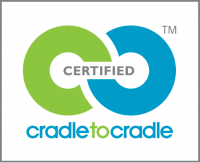
Cradle to Cradle is an internationally recognised certification, setting the environmental and social parameters for manufacturers, brands and designers to create sustainable products which have a positive impact on people and the planet. For a product to be Cradle to Cradle certified, it must be assessed based on five sustainability categories including: water stewardship, social fairness, material health, renewable energy and carbon management. All products are awarded an achievement level (Basic, Bronze, Silver, Gold, Platinum) with reassessment taking place every two years.
The Rise of Ethical Supply Chains
According to the OECD, an ethical supply chain is a regenerative system built on ‘social, human rights and environmental considerations’ which aims to protect those communities and ecosystems that disproportionately shoulder the burden of relentless consumerism. From the ashes of poverty, inequality and environmental devastation rises an ethical revolution as many footwear brands profoundly challenge the industry status quo.
VEJA and Adelante Shoe Co. are just two examples of footwear brands listed in this guide which carefully integrate ethicality across all aspects of the supply chain:
VEJA

© Arthur Wollenveber
Following a social audit in a Chinese factory for a major fashion brand, VEJA founders were appalled by the inhumane working conditions perpetuated by the demands of globalisation. VEJA upholds a supply chain based on fair trade, ethical working conditions, regenerative agroecology and transparency.
- Zero Advertising
According to VEJA, 70% of the cost of mainstream branded sneakers is spent on advertising. Focusing on ‘the real rather than the fiction’, VEJA eliminates marketing costs and instead invests in high- quality production with every model costing 5 to 7 times more to produce than the average competitor’s.
- Ethical Working Conditions
VEJAs are produced in the state of Rio Grande do Sul in southern Brazil where ‘the country brings together robust industries with high social added value’. VEJA employees are paid fairly, live in dignified accommodation, work normal hours and have the right to freedom of expression and unionisation.
- Fair Trade & Regenerative Agriculture
VEJA purchase its organic cotton and rubber straight from producers in Brazil and Peru. This direct partnership reduces intermediaries and creates a respectful trade exchange. VEJA sign annual contracts with producers at a price uncorrelated from the market, so harvesters can live in dignity and know exactly how much they will earn from every crop.
Adelante Shoe Co.

Determined to ‘do business differently’, Adelante was formed in response to the poverty and social injustices which permeate Guatemalan communities. Unlike most industrial supply chains which value profit maximisation over humanity, Adelante’s supply chain is rooted in positive social impact; viewing the craftsmen as a valued stakeholder at the heart of the production process.
- Living Well Line
Adelante developed the Living Well Line to establish a sustainable income for craftsmen and their communities. Defined as a ‘social impact methodology’, the Living Well Line is built on World Bank data and interviews with stakeholders on the ground to identify the goods and services needed for workers to live well. Adelante pay craftsmen directly, so they have financial autonomy to invest in themselves and their families.
- From Cobbler to Customer
Addressing a history of overwhelming disconnect consumers have to a product’s origin and life cycle, Adelante follow a ‘made-to-order’ model; creating an experiential and authentic relationship between cobbler and customer. Each pair of shoes is personalised, with the customer connecting with their cobbler throughout the production process.
Recycled Shoes
What Are Recycled Shoes?
Recycled shoes are footwear made from recycled or naturally-derived materials which can be reused, remade, recycled, or composted once a person decides they no longer want them. Encompassing minimalist design, recycled shoes eliminate the countless hazardous and ecologically damaging materials found in mainstream footwear; transforming post-consumer waste and renewable natural resources into high-quality and durable products.
The concept of recycled shoes is emulated in design activist, writer and researcher Dr Kate Fletcher’s ‘Craft of Use’; the idea we should consolidate and nurture the things (belongings, products, materials) already in use rather than surrendering to the incessant heady cycle of consumer culture.
Are Recycled Shoes Really More Sustainable?
Unlike standard linear manufacturing processes which fail to account for a product’s end of life, recycled shoes follow a sustainable approach based on circularity; closing the production loop in order to prevent consumer waste entering landfills and eternally contaminating the natural world.
In an interview with Tansy Hopkins, journalist and author of Footwork – What Your Shoes Are Doing To The World, Dr Rahimifard from SMART (Centre for Sustainable Manufacturing and Recycled Technologies) discusses his work on ‘Circularity of Material and Resource Use’; the idea human beings are ‘borrowers’, not consumers, of resources and only ever borrow sustainably from the ‘bank of resources’ before returning for reuse.
Developing the first shoe recycling system, Dr Rahimifard and his team believe the future of shoe recycling begins with footwear designers using sustainable materials to ensure shoes can be broken down into component parts and used again later down the line; an approach which effectively underpins the premise and purpose of recycled footwear.
What Are Recycled Shoes Made Of?
Recycled shoes are made of existing materials such as recycled post-consumer waste, or natural resources which are renewable and derived from regenerative farming practices.
Although void of complex design akin to standard footwear models, recycled shoes contain innovative and environmentally progressive materials. For example, bamboo used in shoe uppers self-regenerates like grass and captures CO2, and wild rubber used in shoe soles is harvested by indigenous farming communities who bleed rubber trees without destroying the integrity of the forest. Moreover, recycled shoe design can give new life to post-consumer waste from shoe laces made from recycled plastic bottles, to upcycled corn used for bio-based leather.
Which Footwear Brands Make Recycled Shoes?
Although still a relatively new concept across the ethical footwear industry, many brands in this guide are putting their best foot forward and championing recycled shoe design:
